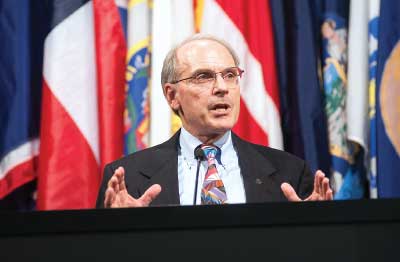Psychiatrist Jeremy Lazarus Appointed to AMA Ethics Council
Abstract
Reports by the council very often address the most difficult or controversial aspects of medical practice and are typically debated in the House of Delegates over several meetings.
Past APA Speaker of the Assembly and past AMA President Jeremy Lazarus, M.D., was appointed to the AMA’s Council on Ethical and Judicial Affairs (CEJA), the independent council that formulates ethical guidance for the medical profession.

Jeremy Lazarus, M.D., says the AMA’s Council on Judicial and Ethical Affairs sometimes generates its own reports on ethical issues and sometimes responds to specific requests from the House of Delegates.
Lazarus, appointed by incoming AMA President Barbara McAneny, M.D., will join fellow psychiatrist James Sabin, M.D., who is the new chair of the council. Sabin was appointed to CEJA by Lazarus in 2012.
For Lazarus, it is a return to active participation in AMA policymaking five years after serving as president (2012-2013), as well as a return to an early motivating passion for medical ethics: Lazarus was chair of the APA Committee on Ethics from 1991 to 1993.
CEJA occupies a special place not only within the AMA’s governance but also in all of medicine; it is the body that maintains and updates the AMA’s 165-year-old Code of Medical Ethics. CEJA’s opinions and policies are used around the country and the world in ethical decision making, medical licensing board determinations, and public policy. APA’s code of ethics is modeled on the AMA code, with “annotations especially applicable to psychiatry.”
“The council is one of the chief pillars of the AMA and has been since the organization was first formed in 1847,” Lazarus said in an interview. “The development of an ethical code of conduct is one of the keys, along with education, to what makes medicine a self-regulating profession.”
The council is an independent body, not part of the AMA’s political process; its members are appointed by the AMA president and approved by the House of Delegates (as opposed to members of other councils, who can be nominated by anyone in the House and must then be elected). CEJA members cannot be voting members of the House, but they can speak for the council on the House floor. “It has a kind of rarified place within the AMA, something like the Supreme Court,” Lazarus said.
CEJA performs a judicial function, reviewing cases of ethical violations brought against physicians; but Lazarus notes that these are brought to the council by state licensing boards, and hence the cases have typically gone through due legal process.
The more “high profile” work of CEJA is its formulation of ethical guidance around issues that are often extraordinarily controversial, sometimes contentious, and almost always fraught with many nuances.
Typically, CEJA reports are brought to the House where they are debated and—more often than not—sent back to the council multiple times over a period of several meetings and two or more years to be reworked. At the June 2011 meeting, for instance, the CEJA report “Financial Relationships With Industry in Continuing Medical Education” was approved on its fifth iteration, having been reviewed and rejected by delegates in meetings of the House of Delegates going back to 2009.
Last year, the entire Code of Medical Ethics was updated, an iterative process begun in 2008 of jettisoning guidance that was no longer relevant, condensing multiple opinions addressing the same subject, and updating the language of the new code using a uniform style.
At the House’s meeting last month, a CEJA report on physician-assisted suicide/physician-assisted dying was sent back to the council by the House for further work and refinement. During reference committee hearings at the House of Delegates, a line of some 150 physicians testified, from numerous perspectives, pro and con, and including personal anecdotes.
Lazarus said that he’ll spend some time “learning the culture” of this important AMA council. As a speaker of the House,with a long history in the House of Delegates, Lazarus brings a special perspective to the work of the council, most of whose members have not been House members. And as a former president, he has permanent privilege of speaking on the House floor on his own behalf.
“To my knowledge I am the first former president appointed to CEJA,” Lazarus said. “I think I have a perspective on how theAMA’s board and the House operate that may help facilitate some of the council’s deliberations.” ■
More information about CEJA and CEJA re-ports can be accessed here.



